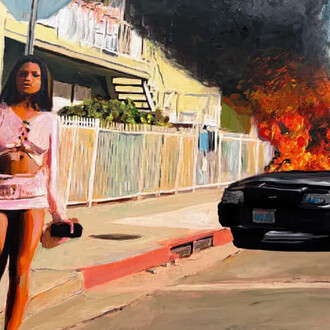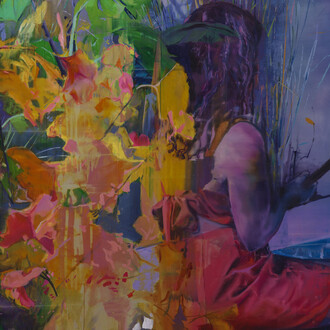The Re Institute is pleased to present “The Rosebud Roar“, works by Guy Walker, Julie Seidl, Richard Tinkler. Most things in life are not straightforward, neither black nor white. Art although it falls into this most general of categories is, at its most sublime, simply right.
Guy Walker
“How dare Krazy Kat hit Ignatz with a brick, doesn't that hoit? At the same time a cockroach, the reincarnated embodiment of Shakespeare, is just to the right of Mehitabel? They talk like Elvin Jones and do all these things that make no sense, but something just feels right. So we see each other and talk of their doings and nod because we really do see what they're up to. We don't have to look that hard.
Julie Seidl
The concrete nature of architectural geometry is the departure point for these fragmented kaleidoscopic compositions. Each square photograph can be seen from any rotation 360C/CW, allowing perception of space to remain infinite. Noticeable are the absence of human figures and the displacement of iconic environments ranging from Las Vegas casinos to New York public schools to suburban churches. The visual disruption of everyday architecture provides the foundation for these ultra-utopian investigations of Twentieth Century Americana.
From the original photographs, symmetrical patterns, the mirrorbox patterns to create the infinite yet unreachable horizon line. For example, image #1 is the source for pattern #2, image #3 creates pattern #4, and so forth. By multiplying the initial photographs described above, the structural elements of Las Vegas Americana can be transposed to interiors. At first glance, the viewer sees the simplicity of shape and color, as in the Mod decor of the 1960's. Close investigation of the photographic patterns reveal the literal elements of the structure: Hotel terraces, curtained windows, broken light bulbs, water stains, and chipped paint. Each detail works equally with the overall architectural abstraction to displace the viewer, while cognitively the mind is constantly firing synapses as it perceives color & form via a universal language such is geometry.
Richard Tinkler
For my contribution to this exhibition I'm showing 16 paintings, each 18x24 inches and all from 2013. Sometimes people ask me where does your work come from? What is it based on? Well I can tell you! The answer is drawing. My drawings are the engine of my work. Since 2004 I have made about 1,800 drawings which I am constantly arranging and editing into a book. This book is an ongoing project. The drawings are like the root system of my work and the paintings are the blossoms. In my work I am always looking for ways to clarify and simplify. One way to do this is through parallels. So for example, in this group of paintings the fecund unfurling of each painting is paralleled in the unfurling fecundity of the whole group. Having said this I don't mean to suggest that I know how to put into words what this work is about but I do mean to suggest the influence of the Baroque on my work, a similar influence to the one Whitman felt. I'm curious to see how these little paintings will fair out of the city with more room and with some, perhaps much needed perspective.








![Susan Wides, Bastion Falls [October 23, 2004], CPrint, 50x40 in.](http://media.meer.com/attachments/b93fe55a7195616b1f486595ab8b446a69ecb0d1/store/fill/330/330/3b5303917474351a64c06e61a8512788768c321eadc257740f0ec630eb45/Susan-Wides-Bastion-Falls-October-23-2004-CPrint-50x40-in.jpg)



